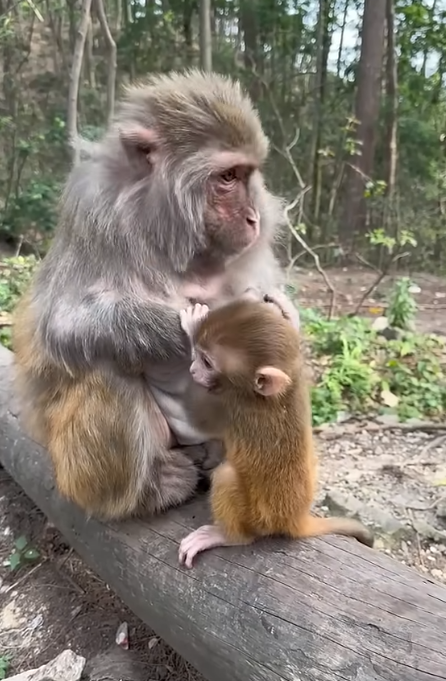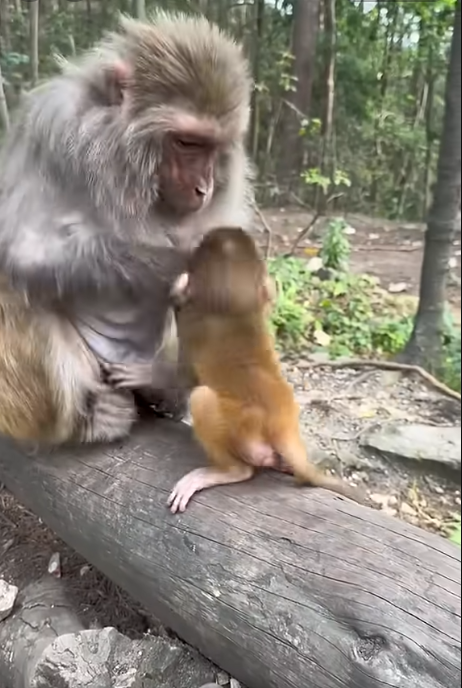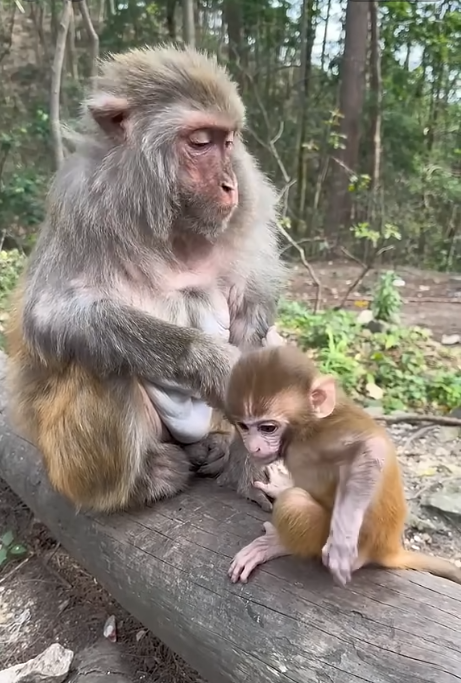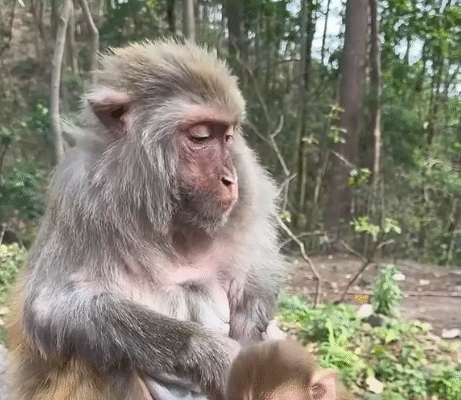
The sun had barely risen over the dense, leafy canopy of the jungle, but Old Moku was already awake, grumbling as he stretched his stiff joints. At seventy-five years old, he had earned a reputation as the wisest, calmest monkey in the forest. He spent most of his days swinging lazily from branch to branch, enjoying the serene rhythm of his own company. But that peace, he knew too well, was about to be completely shattered.
“Ugh… why me?” Moku muttered, scratching his gray-flecked fur. Today was the day he had been roped into babysitting the baby monkey, Tiko, whose parents had left for a week-long trip to the distant mountains. “They could have asked any young monkey… any of the dozens of energetic ones around here,” he complained. “Why did it have to be me?”
Tiko, however, had other plans. From the moment he opened his wide, curious eyes, he was unstoppable. He darted across the jungle floor, squealing and giggling with reckless joy. Moku sighed, following behind as best he could, his limbs aching from years of slower movement. “Slow down, kid! Not everything is a jungle gym!” he shouted, but Tiko only laughed louder, leaping onto a low-hanging branch and swinging like a tiny tornado.
By mid-morning, Moku was already covered in scratches from tangled vines and brambles. His back ached, his knees protested with every leap, and his patience was wearing thinner than the bark of the ancient fig tree where he had rested moments before. “This is misery,” he groaned aloud. “Pure, unadulterated misery.”
But Tiko, oblivious to the concept of misery, had moved on to a new game: splashing in the river. Moku followed, muttering curses under his breath as he balanced on slippery rocks. Tiko’s laughter echoed across the water, bright and wild, while Moku’s old limbs protested each step.
“You’re going to fall, you little rascal!” Moku warned, grabbing for Tiko’s tiny arm. But the baby monkey wriggled free, slid across a mossy stone, and—splash!—tumbled into the shallow river with a delighted squeak.
Moku shook his head, exhaling a long, exasperated sigh. “And they call me wise?” he muttered. “This old monkey is anything but wise today!”

By noon, Moku had discovered the true extent of Tiko’s mischievousness. The baby monkey had a particular fascination with fruits that were not yet ripe. One by one, Tiko would tug at unripe bananas, paw at sour guavas, and even attempt to shake the stubborn coconuts that clung stubbornly to the highest branches. Each failed attempt was met with shrieks of joy, and Moku had to chase after him repeatedly to prevent a catastrophe.
“This is child-rearing gone mad,” he groaned, wiping sweat from his fur. “I’ve survived storms, predators, and even the Great Jungle Fire of ’87, but this…” He gestured helplessly at Tiko, who was now rolling around in a pile of half-eaten guavas. “This is pure chaos.”
Lunchtime brought no relief. Moku had hoped for a brief moment of peace, maybe a small nap while Tiko nibbled on some fruit. But the baby monkey had other ideas. He was fascinated by insects, which meant Moku was forced to catch butterflies mid-air, scoop up ants that had wandered too close to Tiko, and intervene when a particularly brave spider tried to crawl across Tiko’s tiny hand.
“You’ll get us both bitten one of these days!” Moku scolded. But Tiko only laughed, clapping his small hands in delight. He had discovered the thrill of making the old monkey’s gray hairs stand on end, and there was no stopping him.
By mid-afternoon, Moku was so exhausted he could barely stand. His old bones ached, his fur was matted with mud and juice, and his patience had been reduced to a thin, fragile thread. Tiko, meanwhile, had climbed the tallest tree in the clearing and was swinging precariously from the branches.
Moku craned his neck, squinting at the daring acrobat. “You’re going to give me a heart attack!” he shouted. He knew he should scold the little monkey, but every time he tried, Tiko’s innocent eyes and cheeky grin softened his anger—just enough to keep him chasing after the baby without really yelling.
As the sun dipped lower, Moku thought he could finally breathe. “Maybe… just maybe… I can survive the evening without disaster,” he muttered. But of course, Tiko had saved the ultimate surprise for last.
The baby monkey had discovered the old hammock hanging between two trees—Moku’s favorite resting spot. And in classic mischievous fashion, Tiko had climbed inside, swinging wildly. The hammock tilted, tipped, and flung the baby monkey straight into a pile of dry leaves. Moku winced, sprinted over, and checked on him. Tiko was unharmed, of course, but Moku’s exhaustion boiled over into loud groans.
“This is unbearable!” he cried. “I can’t… I cannot…” He trailed off, staring at Tiko, who was already laughing and trying to climb back into the hammock.

Yet, in the chaos, something strange happened. Despite the scratches, bruises, and aching joints, Moku found himself laughing. A small, deep laugh that started in his chest and slowly spread across his face. Tiko’s uncontainable joy, so infectious and pure, melted some of the misery he had felt all day.
“You little terror,” Moku muttered, shaking his head, though there was a smile beneath the grumbles. “You make an old monkey miserable, but… somehow… I can’t stay mad at you.”
Even as the stars began to appear overhead, Moku realized that this day, with all its exhaustion and chaos, had changed something inside him. Tiko, with all his energy, all his mischief, and all his wild curiosity, reminded the old monkey of the world he had once known as a young monkey—full of adventure, laughter, and little surprises around every corner.
When Tiko finally fell asleep in Moku’s arms, tired from the day’s adventures, the old monkey sighed contentedly. His body ached, and his fur was a mess, but his heart was full in a way it hadn’t been for years. “This old monkey is miserable,” he whispered softly, stroking the baby’s fur, “but maybe… just maybe… this misery is worth it.”
By the next morning, Moku knew he would face another day of chaos, mud, fruit, and constant chasing. But somehow, he didn’t mind as much. After all, raising a mischievous baby monkey was exhausting, frustrating, and utterly maddening—but it was also a reminder that life, even in its most chaotic forms, was still wonderfully alive.
And so, the old monkey learned that misery could coexist with joy, frustration could exist alongside laughter, and even the wildest little monkey could teach an old one lessons in patience, love, and finding delight in the smallest of moments.
By the time Tiko’s parents returned, Moku was exhausted but smiling. He handed the little monkey over with a mixture of pride and relief. “Take good care of him,” he warned, voice hoarse. “And if he’s ever this wild again, don’t blame me if I scream.”
Tiko squeaked happily, waving goodbye, while Moku collapsed under a tree, exhausted but secretly grateful for every minute of the chaos. Because even in misery, there was joy—and even in the wildest days, there was love.



